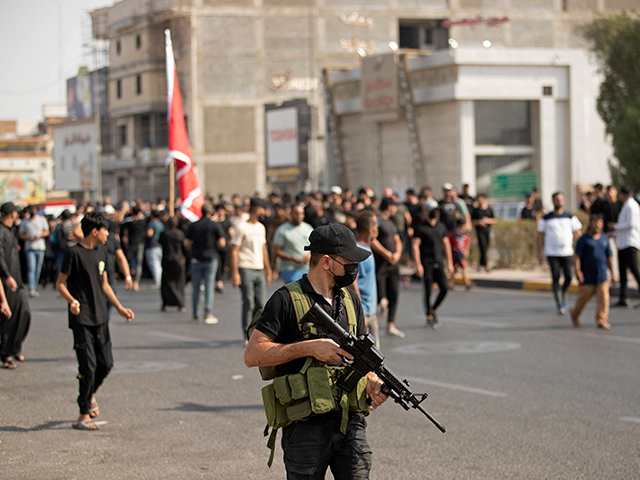Shiite militias in Basra, Iraq, opened fire on each other early Thursday morning in what the Kurdish news outlet Rudaw described as “heavy confrontations,” just days after Shiite followers of anti-Iranian cleric Muqtada al-Sadr stormed the capital, Baghdad, prompting riots that left at least 30 people dead.
The ongoing strife is the result of a political crisis that has left Iraq without a functional government. Following the collapse of the Sunni-led socialist Baath regime under Saddam Hussein, Shiite Arab Iraqis have largely dominated national politics. Those in power, particularly during the war against the Islamic State terrorist organization, have allied themselves with the Islamist regime of neighboring Iran, the world’s largest Shiite state.
The violence erupting this week has mostly affected Baghdad and the south of the nation, where most of its Shiite Arab population resides. While regional Kurdish leaders have offered to help with reconciliation, Kurdish factions are playing no prominent role in the riots.
Jihadist militias allied with and backed by the Iranian government became a formal wing of the Iraqi armed forces under the umbrella organization the Popular Mobilization Forces (PMF) in 2016, at the height of the war with the Islamic State and at a time during which Iraq’s actual military was doing little to protect the country from the “caliphate.”
Many Iraqis support Sadr’s movement as an alternative to the Iran-backed Shiite forces. Sadr stridently opposes all foreign intervention and is particularly antagonistic towards America and Iran.
Sadrists won the last round of legislative elections in October but, facing pressure from pro-Iran factions, Sadr ordered his party to resign en masse, leaving Iraq without a government to this day. On Monday, Sadr dramatically announced an alleged “final” retirement from politics – despite the announcement not being his first alleged retirement – prompting the riots in Baghdad.
Rudaw reported on Thursday that Sadr’s Saraya al-Salam militia engaged in “heavy confrontations” with the PMF militia Asaib Ahl al-Haq (AAH), a U.S.-designated terrorist organization, in Basra, citing a “civil society source.” The clashes reportedly began in the early morning hours of Thursday.
“Sources told Rudaw that the fighting broke out in response to the killing of a member of Saraya al-Salam outside the offices of Asaib Ahl al-Haq,” the outlet relayed.
Reuters similarly reported that ongoing clashes in the city were triggered by rival Shiite groups and that the fighting had killed four people at press time.
“The security situation in Basra is really bad, and could escalate,” an anonymous “security official” told Reuters, though Iraqi government affiliates reportedly claimed to Rudaw that the situation is “under control.”
Reuters also claimed that Sadrists had attacked PMF militia offices “in recent days,” reportedly prompting the AAH attack on their fighters.
Videos shared by Middle Eastern media outlets from Basra show significant fighting in the pre-dawn hours of Thursday.
#BREAKING: Iraqi Security Media Cell said in a tweet that suspects were arrested in Basra after a murder incident. Moreover, it said the security situation is now under control after the deployment of security forces and calm is restored.
📹 Al-Jidar pic.twitter.com/33j7NT8Eld
— Kurdistan 24 English (@K24English) August 31, 2022
WATCH: The southern #Iraqi city of #Basra witnessed clashes among rival Shi'ite Muslim militants overnight and into Thursday morning, according to local security authorities. pic.twitter.com/SdCbEbveRf
— BNN Ghana (@BNNGHnews) September 1, 2022
ℹ️🏪➡️🇶⬇️Pro-Sadr Iraqis hold funeral after Shiite rivals clash in Basra: Iraqi mourners attend the funeral of two Saraya al-Salam fighters, an armed faction linked to powerful Shiite cleric Moqtada Sadr, in the southern Iraqi city of Basra. Four militants were killed overnight pic.twitter.com/htLfjHcq5C
— World News 24 (@DailyWorld24) September 1, 2022
The violence in Basra echoed the clashes in Baghdad on Monday, which resulted in 30 dead and hundreds injured after rival militias began opening fire on each other. The Baghdad riots also resulted in the occupation of the presidential palace and Sadrist overrunning the lavish residence and swimming in its pool.
The riots in the capital ended abruptly after Sadr himself delivered remarks on Tuesday declaring that his supporters were embarrassing him and giving them all an hour to vacate Baghdad’s Green Zone, where government offices and foreign embassies are located.
“It saddens me a lot what happens in Iraq; I apologize to the Iraqi people, the only ones affected by the events,” Sadr said, according to a translation by Iranian state outlet PressTV, in a nationally televised address. “We had hoped that there would be peaceful protests, not weapons.”
“Change your minds and withdraw completely, even from the sit-in,” he commanded, ending the riots in minutes.
The Iraqi government decreed three days of mourning on Wednesday for the dozens killed in the clashes. The country still has not formed a government, however, and the violence has prompted reports that Baghdad may cede to Sadr’s demand and dissolve the legislature, leading to a new round of elections.
The Iraq-based network Kurdistan 24 reported on Thursday that the nation’s Supreme Court “is currently in session with regards to ruling on a case about dissolving the Iraqi parliament,” citing an unnamed source. The outlet noted that the court had repeatedly delayed any deliberation on the matter and suggested the threat of nationwide violence in response to the lack of organized government had expedited the need for such a conversation.
The Iraqi government has yet to confirm that the court is reviewing dissolving parliament at press time.
The status of Sadr’s alleged retirement also remains a mystery, as his rapid return to delivering national speeches indicated he was not yet done with political work. Rudaw observed on Thursday that one of his closest political associated, who had announced a similarly ostentatious departure from politics by posting a photo reading “closed” on his Twitter account, had since updated his social media – suggesting that Sadr’s political operation was still active.

COMMENTS
Please let us know if you're having issues with commenting.